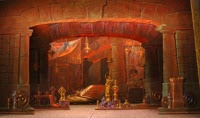Julius Caesar

By William Shakespeare, Directed by Rick Barbour
Great River Shakespeare Festival Apprentice Acting and Intern Company
July 24, 2007
The now traditional introduction of the cast of characters that begins all Great River Shakespeare Festival productions seemed as if it would never conclude on Tuesday night as the Apprentice Acting and Intern Company presented Julius Caesar for the first of two performances. The cast of Senators, conspirators, soldiers, and citizens—with many actors taking on two, and three roles told the the story of the plotting and successful murder of Julius Caesar and the ensuing fight for control of Rome that takes place after his grizzly death. The story is full of clasping of hands and heart-felt declarations of love and loyalty to each other and to Rome. It also contains delicious deceit and political betrayal.
Philip Zimmermann as Julius Caesar and Caesar’s ghost, and even Caesar’s statue, carries the name of the play well, though his character is involved little with the development of the plot—he is the unwitting object of it. Led by the tenacious Anna Sundberg as Caius Cassius, a group of Senators plots against Caesar to prevent him from becoming “too strong.” Like all politicians, they assure themselves that their motives are not for personal gain, but for love of country. And to this end, and for political cover, they mus convince the honorable Brutus to join the conspiracy. David Utter plays the honest friend of Caesar and the recipient of Caesar’s famous words, “Et tu, Brute?”
Julius Caesar has an amazing amount of words, words that have entered the day to day lexicon of modern America and words put together in speeches lengthy, bold, and pretentious. These Apprentices and Interns had to learn all of these words while understudying the main festival productions, putting up posters, setting up tents, selling coffee and cookies, directing traffic, lifting barges, and toting bales. Anyone involved with the festival will tell you that these young actors, stage hands, and technicians have been working hard this summer.
Julius Caesar depicts a politics familiar to anyone following American politics—though the falling on swords and spilling of blood are generally metaphoric in today’s picture. Mark Anthony’s funeral speech for Caesar—“Friends, Romans, Countrymen, lend me your ears!”—signals a turn in the play by using a brilliant rhetorical device that has often been imitated. Stepping up after Brutus has convinced the citizens of Rome that Caesar’s death was necessary to protect Rome, Chris Lysy as Mark Anthony turns their affection back against Brutus with his humble repetition of Brutus’s honor:
He was my friend, faithful and just to me;
But Brutus says he was ambitions,
And Brutus is an honorable man. (III.ii.84-86)
Along with the blood, nearly every character is smeared with politics in the hand clasps, oaths, and love of country. My anthology calls this The Tragedy of Julius Caesar. But it’s more truly Brutus’s tragedy, and even more truly, it’s the tragedy of those who mistake political ends for moral ends. It might be a preview of the upcoming presidential elections.
This is a production that you’ll want to skip work on Friday afternoon to see. It’s great acting, great production, and great theater. Congratulations to the Apprentices and Interns for a job well done.
Julius Caesar plays Friday at 3:00 p.m.
Visit the Great River Shakespeare Festival for schedules: Great River Shakespeare Festival







 One scene from "Drops and Drama III"
One scene from "Drops and Drama III"


